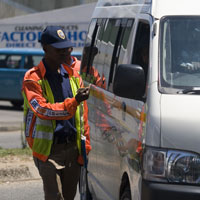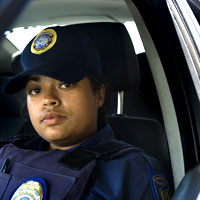”This, my dear, is the man in charge of the freeways,” serves as my introduction to acting Inspector Bongani Mavuso of the Johannesburg Metro Police Department (JMPD).
Edna Mamonyane, the department’s spokesperson, is quick to inform me that Mavuso is one of the hardest workers in the department. ”You know, the guys who really make the difference,” she says.
Mavuso is our driver, and we are in one of the department’s fleet of cars, a BMW, and my photographer and I are guests of the JMPD.
We leave the labyrinth that is Selby in downtown Johannesburg, and head for a roadblock on Louis Botha Avenue in Bramley, north of the city.
We jump straight into a discussion about what makes a great metro officer, and Mamonyane offers: ”I always tell people that it’s not about the number of police officers you have out there. It is about the commitment and passion those officers who are out there impart and share with each other. They are serving the community, and should therefore make them a priority.”
”There was a time when passion and the will to do your job motivated officers to not only do more, but better too,” she says.
Mavuso agrees: ”And the best thing is that conditions were less favourable than they are presently. When we first joined the department, we had less in the way of infrastructure and equipment, and it wasn’t easy, but we did achieve a lot, as far as I’m concerned.”
The comparisons between old school and new school are not surprising, given the current unspoken culture of officers soliciting bribes from traffic offenders.
”The thing is that there are officers who are not committed and motivated by the same things that drew our generation of officers to the profession,” says Mamonyane. ”Some of them are about the power trip, unfortunately, at the expense of public out there. We do get complaints about service, officers dragging their feet in filing accident reports and that sort of thing, and it does worry the management of the department. It’s a definite dark spot on our achievements, and that’s the very attitude we should change.”
”Another thing that exacerbates the situation is that the public is not fully educated or informed on how things work within the department. One example of this is when a member of the public phones in to a radio station’s breakfast show and starts reporting on having seen metro police officers standing outside their parked cars at a filling station and drinking coffee, right next to a freeway with chaotic traffic!
”A lot of the time the hosts of such shows will not try to get a comment out of the department as to why that was. Unfortunately, we don’t get the chance to tell them about some filling stations providing complementary coffee for officers — for when they take a break or when they’ve been working overnight and just need to catch a cup of coffee on a cold morning. And I can assure you, our officers would not stand there and drink coffee if they were needed at an emergency.”
We are on the M1 now, heading north, when we spot a bike officer on the other side of the highway. He has stopped a Toyota Quantum minibus with three men inside. We turn around and drive back, and discover the officer became suspicious because the minibus didn’t have registration plates. It also turns out the vehicle is not registered and is not roadworthy.
Mamonyane immediately points out the danger in this situation: one officer on a motorbike questioning three suspects — possibly armed — with no back-up.
”The officer probably thought the worst-case scenario would be that the driver just did not have the vehicle’s registration plates, but only discovered later there was more to it than that.”

Metro officer Michel Mzimba. He is one of 10 officers on bikes in and around Johannesburg Delwyn Verasamy, M&G)
It turns out the officer actually had called for back-up, and as soon as it arrives, we continue with our journey. The department has deployed about 10 bikes on the highways, but there are plans to increase that number.
”I can’t preach it enough to our guys that as much as we’re here to catch the bad guys, one has to be smart in the way one assesses a situation, and needless to say, be quick in calling for back-up where necessary,” says Mamonyane. ”We had an officer shot and wounded last night. He is in hospital as we speak.”
”It reminds me of back in the days when I used to do patrol duty in Soweto in the 1990s, and the constant nagging feeling at the back of my mind that I am here to serve my community, but all I am to a criminal is a passport to a free gun. Officers got killed a lot then, and you would find out during the course of the investigation that all the thugs were after was the officer’s service firearm.”
We arrive at the Louis Botha roadblock and the man running the show, Sergeant Michael Botolo, gives us the grand tour. He’s happy to announce that since they started using a camera at roadblocks two years ago, there has been a decrease in the number of complaints over service. Registration plates are photographed, which are then cross-referenced against a database of outstanding warrants.
”As much as motorists are annoyed by having to stop to get checked by metro police officers, a lot of them do appreciate that the department has implemented systems such as this one to make it easier for them,” says Botolo.

A metro police officer checks a motorist’s licence at a roablock in Bramley, Johannesburg (Delwyn Verasamy, M&G)
Sindisile Gamede has been with the department for three years, and is one the few female officers on site. She lives in Midrand with her fiancé and one-year-old son, Olwethu. She tells me about a typical day at work, which starts with a morning parade at 6am. Officers’ uniforms, equipment and weapons are checked for safety and there’s a roll-call.
Gamede plans on being promoted to inspector, or even the chief of the metro police. ”There are no limits,” she says.
”I wouldn’t be true to myself if I didn’t mention that one of my biggest goals is to see the department make the money it needs. People pay taxes to see an improvement in service delivery, and I am glad when I can do my bit, bringing offenders to book,” she says shyly.
Another officer, Thandanani Hlongwane, from Esther Park on the East Rand, has also been with the department for three years.
”I grew up wanting to become a policeman. My uncle is a policeman, and I respected him a lot while I was growing up — the fact that he would get up everyday to do this job even though policemen have not been very popular with people in the townships for a long time,” he says.
”I knew that if I was going to do something in the line of law enforcement, I would have to do better than the police force, and so far I’m happy with choices I’ve made regarding my career.”
Hlongwane says being in the metro police — in contrast to the South African Police Service — means that he concentrates on Johannesburg and has a ”ground view” of what needs to be done.
”But just as in any other organisation, things here are not always rosy. There are things that I, as someone on the ground, see as needing changing, but management see things differently, so we end up at in a position of agreeing to disagree.”
‘For every corrupt officer out there, there’s a corrupt motorist’
This sentiment is shared by officer Siobhan Rose, who has been with the department since 2004. She says even getting a proper uniform can prove to be a battle.
”It may seem like an unimportant issue to bring up, but it just highlights the extent to which some elements within the department are disorganised, and this puts a lot of people at a disadvantage,” she says.

Metro police officer Siobhan Rose. She is a member of the JMPD’s freeway squad(Delwyn Verasamy, M&G)
Rose is part of the highway squad, and we meet her and two of her colleagues, officers Marius Boolsen and Flynn van Rensburg, on the M1 South, near Rosebank.
Boolsen and Van Rensburg are also veterans of the department. Van Rensburg was, in fact, stationed in Alexandra for eight years in the 1990s, and was nicknamed ”Thulani” by the community, because of his quiet nature.
Boolsen has his own stories to tell, but says that is for another time. ”What I do want to say is that my fellow officers need to know that in this line of work, it’s up to us, the people who do it, to motivate ourselves to do good, and deliver to the public out there.”
”Tjotjo [a bribe] has been around since the beginning of time. Jesus was sold for 30 parts of silver by Judas Iscariot. Who are we to declare that we can end it now?
”It’s up to an individual to correct himself when he is tempted. We as the department cannot collectively stamp out corruption among our officers, because for every corrupt officer out there, there is a corrupt motorist enabling that bribe.”
On our way back to base, Mamonyane says there’s no more rewarding feeling than leading officers into an operation — where the situation could turn volatile at any point — and managing to bring them back safely.
”It’s the saddest feeling when you get a call to say an officer has been killed. One of the thoughts racing through your head is ‘I hope it’s not one of the guys in my team’, not because you have less regard for other teams’ members, but because a member of your own team is like a member of your family, and nobody likes the feeling of losing a family member.”
As metro officers are widely acknowledged to know of such things in the townships, I have a last question for Mavuso. Where are the best shisa nyama (buy-and-braai) spots?
”Without a doubt, the place near Nancefield Hostel that sells pap and skop [braaied sheep’s head]. Although I must say that our chief advised recently that the team engage in healthier eating habits, so I might just start buying Nando’s.”